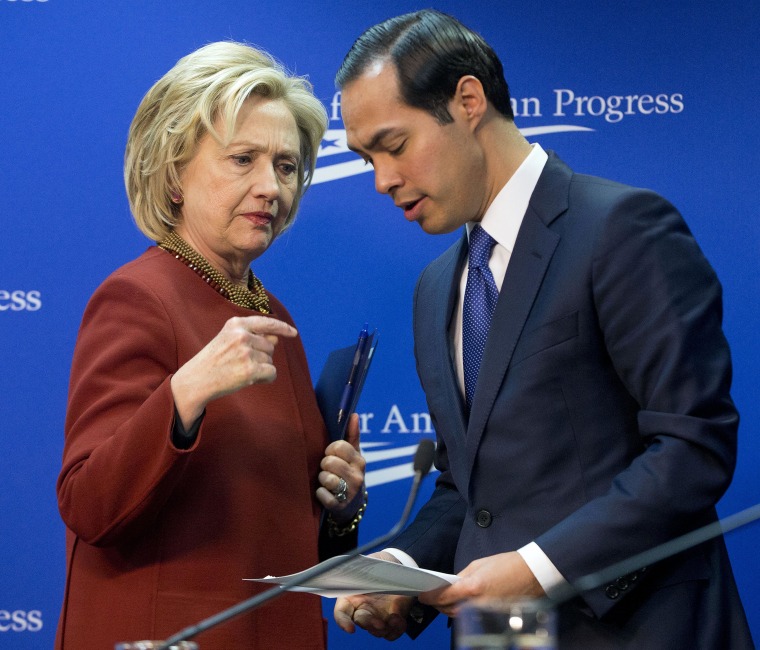They were at separate tables and divided by a moderator, but potential 2016 presidential candidate Hillary Clinton and Housing Secretary Julían Castro were on the same page about creating more opportunity in America’s urban centers.
Castro used what became the operative idea of Monday’s event organized by the Center for American Progress: collaboration across government agencies _ or as another speaker described it, using a phrase invoked by Clinton and made the title of her 1996 book, “it takes a village.”
An announcement is pending from Clinton, the former first lady, a former U.S. senator and Obama’s former secretary of state, on her plan for 2016. Castro is considered a potential runningmate.
But the two seemed to be in sync during the policy discussion on urban areas, described by Lee Saunders, president of the American Federation of State County and Municipal Employees union, as experiencing revitalization, but only in limited areas.
Clinton said the country needs to make sure cities are not just “places of economic prosperity and job creation on average,” but are renewed in a way “that lifts everybody up to deal with the overriding issues of inequality and lack of mobility” economically.
“How do we make what we already have more of an attraction? . . . How do we repair and update a lot of our infrastructure?” Clinton asked. She said she is looking at not only what can be done by working across governmental lines, but also through public-private partnerships.
Later in the discussion, Castro gave something of a response to her questions.
“If I have one piece of advice for local leaders around the country, it would be to break through the silos that often exist at the local level,” Castro said, drawing on his experience as San Antonio’s mayor from 2009-14.
He told of serving on San Antonio’s city council and trying to find a place for limited street maintenance and repair resources. A woman complained of the long wait for sidewalks in her neighborhood and how her diabetic mother had been told by her doctor to do more walking.
“For me as a policymaker, it drove home this idea that all of these things that we do are connected … It’s infrastructure. It’s health. It’s economic development, the housing,” Castro said.
Clinton also expressed her support for pre-kindergarten. Castro managed to expand pre-K in San Antonio with help from a sales tax increase approved by the city's voters in 2012.
Janet Murguia, the head of the National Council of La Raza who served in the administration of former President Bill Clinton, also participated in the panel. She promoted the role of Latino-owned small businesses in communities and pointed out that Latinas are the fastest growing segment of the small business owner community.
“Many times they are doing that out of sheer grit and will and yet there’s still not enough support and services to keep these small businesses sustainable," she said.
